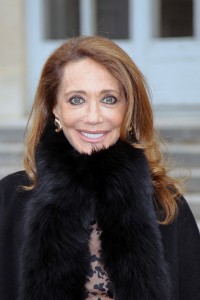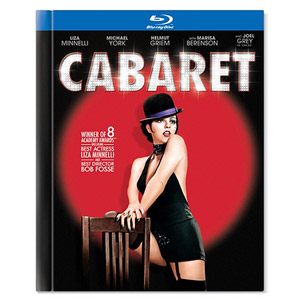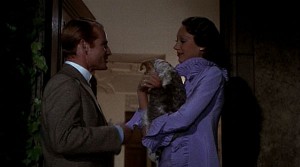 New York-born Marisa Berenson emerged as a glamorous fashion model in the early 1960s before making her move into acting as the decade came to a close. Following her big screen debut in Luchino Visconti’s Death in Venice (1971), Ms. Berenson went on to a featured role in Bob Fosse’s Academy Award-winning 1972 film adaptation of the Broadway musical Cabaret. Set in Berlin during the Weimar Republic in 1931, the film’s major subplot (one that did not appear in the stage version), finds Ms. Berenson portraying Natalia Landauer, a privileged German-Jewish apartment store heiress who’s romantically pursued by a German Jew (Fritz Wepper) passing as a Christian. Ms. Berenson’s performance was critically lauded, earning her an award for Best Supporting Actress by the National Board of Review and Golden Globe nominations for Best Supporting Actress and Most Promising Newcomer.
New York-born Marisa Berenson emerged as a glamorous fashion model in the early 1960s before making her move into acting as the decade came to a close. Following her big screen debut in Luchino Visconti’s Death in Venice (1971), Ms. Berenson went on to a featured role in Bob Fosse’s Academy Award-winning 1972 film adaptation of the Broadway musical Cabaret. Set in Berlin during the Weimar Republic in 1931, the film’s major subplot (one that did not appear in the stage version), finds Ms. Berenson portraying Natalia Landauer, a privileged German-Jewish apartment store heiress who’s romantically pursued by a German Jew (Fritz Wepper) passing as a Christian. Ms. Berenson’s performance was critically lauded, earning her an award for Best Supporting Actress by the National Board of Review and Golden Globe nominations for Best Supporting Actress and Most Promising Newcomer.
DiscDish spoke to the ever-elegant Ms. Berenson earlier this week when she and her fellow Cabaret castmates Liza Minnelli (The Sterile Cuckoo), Joel Grey and Michael York were in New York to talk up the film’s long awaited Blu-ray debut from Warner on Feb. 5.
DiscDish: What memories do you have of your first day of shooting Cabaret?
Marisa Berenson: It was the day I arrived in Munich—I got there and we started filming that first day. It was the tea party scene and I was obviously very nervous. I come walking into the scene wearing this big, beautiful hat. And during that first take, the hat is shaking. So Bob stops the scene and asks, ‘Why is your hat shaking?’ And I said, ‘Because I’m trembling, I’m so nervous!’ And he laughed and told me to calm down. But everyone was so nice—Liza and Michael and everyone. And it became a very fun movie very quickly.
 DD: From Visconti on Death in Venice to Fosse on Cabaret to Kubrick on Barry Lyndon in 1975. Not a bad trio of filmmakers for your first three films! I’m hoping Mr. Fosse warmed you up a bit for Kubrick!
DD: From Visconti on Death in Venice to Fosse on Cabaret to Kubrick on Barry Lyndon in 1975. Not a bad trio of filmmakers for your first three films! I’m hoping Mr. Fosse warmed you up a bit for Kubrick!
MB: With Stanley, I never actually did a screen test. He saw me in Cabaret and thought I was German because of the accent. He and [filmmaker] Stanley Donen were very good friends and I had known Stanley Donen since I was a little girl because he was friends with my parents. So when Kubrick spoke to Stanley, he mentioned to him that he thought he had found the perfect girl for Barry Lyndon, but he was worried about what kind of performance she would give because she had a German accent. He said my name and Stanley Donen said to him, ‘Are you kidding? I’ve known her since she was a child and she’s not German!” So Stanley Kubrick called me up and the first thing he did was dissect my whole performance in Cabaret and then he told me about his next film, Barry Lyndon. And that’s how it all began.
DD: Wow, I think the craziest part of that story is that Stanley Donen and Stanley Kubrick were actually friends!
MB: Oh yes, there were very close. And they were both extraordinary directors. And they were both very demanding on themselves and very demanding on others. Bob Fosse was the same way.
DD: Okay, back to Cabaret, which was Fosse’s first film. Did he ever express any doubts or nervousness on the set?
MB: No, no. He was very cool, very very cool. Then again, I was so young and inexperienced and learning so much from everything that was happening around me, I don’t know if I would recognize if he was nervous!
DD: And what were Fosse’s most distinctive traits as a filmmaker?
MB: He was really an actor’s director. He loved actors and he loved to challenge and provoke. And he loved to work with actors and he had different ways to bring the best out of you. He used all kinds of strange tricks…
DD: Like what?
MB: He would come up and whisper very strange things into my ear to make me feel a bit uncomfortable and to get me into a certain mood for my character. Sometimes he would whisper obscene things into my ear.
DD: Really? Could you be more specific?
MB: (laughing) I really can’t remember, but I do remember being shocked!
DD: That’s wild. I always picture Fosse being just like Joe Gideon character in All That Jazz, his autobiographical film.
MB: Oh he was that guy—he was very much that guy. Up until the week he died, I remember going to visit him in the hospital and he was still smoking and drinking, even while he was there. He insisted on enjoying himself—he wouldn’t have liked life without it. What a fantastic, cultured man.
|
Buy or Rent Cabaret 40th Anniversary
|
|||
|---|---|---|---|
DVD |
 DVD | Blu-ray DVD | Blu-ray |
 DVD | Blu-ray DVD | Blu-ray |
|

Leave a Reply